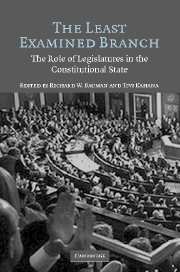Book contents
- Frontmatter
- Contents
- Foreword: Legislatures in the Constitutional State by Amy Gutmann
- Contributors
- New Ways of Looking at Old Institutions
- PART ONE LEGISLATURES AND DEMOCRATIC THEORY
- PART TWO LEGISLATING AND DELIBERATING IN THE DEMOCRATIC LEGISLATURE
- PART THREE CONSTITUTION MAKING BY LEGISLATURES: THE EXPLICIT VERSION
- PART FOUR CONSTITUTION MAKING BY LEGISLATURES: THE IMPLICIT VERSION
- PART FIVE CONSTITUTIONAL INTERPRETATION AND APPLICATION BY THE LEGISLATURE
- PART SIX IS LEGISLATIVE CONSTITUTIONALISM POSSIBLE?
- 20 Democratic Decision Making as the First Principle of Contemporary Constitutionalism
- 21 Legislative Constitutionalism in a System of Judicial Supremacy
- 22 Between Supremacy and Exclusivity
- 23 Legislatures as Rule-Followers
- 24 Popular Revolution or Popular Constitutionalism? Reflections on the Constitutional Politics of Quebec Secession
- PART SEVEN THE LEGISLATURE IN DIALOGUE: DOMESTIC AND INTERNATIONAL CONTEXTS
- Index
22 - Between Supremacy and Exclusivity
Published online by Cambridge University Press: 06 August 2009
- Frontmatter
- Contents
- Foreword: Legislatures in the Constitutional State by Amy Gutmann
- Contributors
- New Ways of Looking at Old Institutions
- PART ONE LEGISLATURES AND DEMOCRATIC THEORY
- PART TWO LEGISLATING AND DELIBERATING IN THE DEMOCRATIC LEGISLATURE
- PART THREE CONSTITUTION MAKING BY LEGISLATURES: THE EXPLICIT VERSION
- PART FOUR CONSTITUTION MAKING BY LEGISLATURES: THE IMPLICIT VERSION
- PART FIVE CONSTITUTIONAL INTERPRETATION AND APPLICATION BY THE LEGISLATURE
- PART SIX IS LEGISLATIVE CONSTITUTIONALISM POSSIBLE?
- 20 Democratic Decision Making as the First Principle of Contemporary Constitutionalism
- 21 Legislative Constitutionalism in a System of Judicial Supremacy
- 22 Between Supremacy and Exclusivity
- 23 Legislatures as Rule-Followers
- 24 Popular Revolution or Popular Constitutionalism? Reflections on the Constitutional Politics of Quebec Secession
- PART SEVEN THE LEGISLATURE IN DIALOGUE: DOMESTIC AND INTERNATIONAL CONTEXTS
- Index
Summary
The Constitution of the United States is a broad charter that establishes the structure of government and identifies the values to which the country aspires. All Americans have the prerogative as well as the responsibility to give this charter meaning in our day-to-day lives. We live under the Constitution and must be faithful to its mandates. This duty of fidelity applies as forcefully to ordinary citizens as it does to public officials.
Throughout history, the Supreme Court has been depicted as the final arbiter of the meaning of the Constitution. Such a view does not deny the role that the other branches of government or, for that matter, the general citizenry have in interpreting the Constitution, but only posits a priority for the interpretations of the judicial branch. The governing assumption is that where there are conflicting interpretations, the Court's should prevail.
In our time, this assumption found powerful expression in Brown v. Board of Education and in the struggles to make that decision a living reality. This assumption is now being challenged by a movement in the legal academy known as legislative constitutionalism, which claims a new and important role for Congress in the process of constitutional interpretation, but which, I am sad to say, is born of a misunderstanding of the role of the judiciary during the civil rights era and of a frustration with the Court ever since.
HISTORICAL ROOTS OF LEGISLATIVE CONSTITUTIONALISM
The Supreme Court's decision in Brown v. Board of Education declared the Jim Crow system of school segregation unconstitutional and in so doing set aside the laws of seventeen states and the District of Columbia.
- Type
- Chapter
- Information
- The Least Examined BranchThe Role of Legislatures in the Constitutional State, pp. 452 - 467Publisher: Cambridge University PressPrint publication year: 2006
- 1
- Cited by

